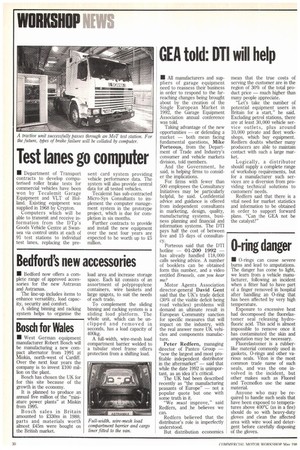GEA told: DTI will help
Page 142

If you've noticed an error in this article please click here to report it so we can fix it.
• All manufacturers and suppliers of garage equipment need to reassess their business in order to respond to the farreaching changes being brought about by the creation of the Single European Market in 1992, the Garage Equipment Association annual conference was told.
Taking advantage of the new opportunities — or defending a market — both mean facing fundamental questions, Mike Porteous, from the Department of Trade and Industry's consumer and vehicle markets division, told members.
And the Government, he said, is helping firms to consider the implications.
For firms with fewer than 500 employees the Consultancy Initiatives may be particularly helpful, he said. Confidential advice and guidance is offered from independent consultants in marketing, design, quality, manufacturing systems, business planning and financial and information systems. The DTI pays half the cost of between five and 15 days of consultancy.
Porteous said that the DTI hotline — 01-200 1992 — has already handled 118,000 calls seeking advice. A number of booklets can be obtained form this number, and a video entitled Brussels, can you hear me?
Motor Agents Association director-general David Gent said that the UK's trade deficit (30% of the visible deficit being road vehicles) problems will demand an ultimate result in European Community sanction for specific measures that will impact on the industry, with the real answer more UK vehicles and components manufacture.
Peter Redfern, managing director of Pante° Group — "now the largest and most profitable independent distributor in the aftennarket" — said that while the date 1992 is unimportant, as an idea it's critical.
The UK had been described recently as the manufacturing peasants of Europe" — not a popular quote but one with some truth in it.
"We must improve," said Redfern, and he believes we can.
Redfern believed that the distributor's role is imperfectly understood.
But distribution economics mean that the true costs of serving the customer are in the region of 30% of the total product price — much higher than many people appreciate.
"Let's take the nutriber of potential equipment users in Britain for a start," he said. Excluding petrol stations, there are at least 30,000 vehicle service outlets, plus around 10,000 private and fleet workshops, which buy equipment. Redfern doubts whether many producers are able to maintain contact with such a large market.
Logically, a distributor should supply a complete range of workshop requirements, but for a manufacturer such services are a diversion from providing technical solutions to customers' needs.
Redfern said that there is a vital need for market statistics and information to be obtained in order to support forward plans. "Can the GEA not be the catalyst?"




















































































































































